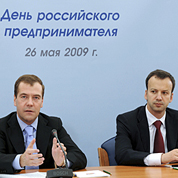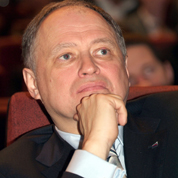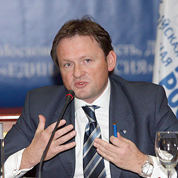President and private companies CEOs talk ‘business issues’ on Entrepreneurs’ Day

Russia’s rapidly growing army of private businesses owners marked the official Entrepreneurs’ Day last month last month with a series of high-profile activities and events, including meeting with the nation’s political leadership, aimed at enshrining, popularizing and commemorating the spirit of free private entrepreneurship in the country. Indeed, one of the central events unmasked on May 26, the nation’s Entrepreneurs’ Day, was the meeting of the CEOs of private companies in the SME segment of the economy with the Russian president, Dmitry Medvedev, who used the opportunity to congratulate the growing army of local private businesses owners.
The red-lettered day commemorates the 21st anniversary of the first law on ‘Cooperation in the Soviet Union’ that was adopted 1988, which gave the ‘green light’ to development of free private businesses in the USSR. The law later became the base for the creation of the legal foundation for running private businesses in Russia after the disintegration of the Soviet empire. “I would like you to congratulate you all on this red-lettered day and at the same time note that it is certainly not an easy job to be entrepreneur in Russia,” the president said. “I know this personally, and not through ‘hearsays’ because I was also once engaged in business and know how businesses are run in the country,” he added. “These difficulties and problems notwithstanding, running private businesses is an interesting work, which is very useful to the government because a country that has no successfully functioning private entrepreneurship sector, simply does not have a future.”
Discussion of acute problems facing private entrepreneurs
The first official celebration of this anniversary took place in 2008 following the Russia government’s approval of the local business community’s request to declare May 26 an official day for the entrepreneurs. The approval of the request marked the recognition of the growing importance of private entrepreneurship by the government as well as the reflection of all the major economic changes that had taken place in Russia in the past 21 years. Business owners in all cities use the day to hold forums, exhibitions and ‘round table’ discussions, devoted to the problems confronting the small- and medium-sized enterprises (SMEs) in particular, and the development of private entrepreneurship in the country as a whole.
“The red-lettered day commemorates the 21st anniversary of the first law on ‘Cooperation in the Soviet Union’ that was adopted 1988, which gave the long-awaited ‘green light’ to the development of free private businesses in Russia.”
However, congratulations and meetings with the representatives of the federal and regional authorities, who define the destiny, growth rate and the general direction of the vector of development of private entrepreneurship, always rate higher on the business community’s agenda and programs, as they enable the CEOs to speak directly to top government officials, including both president and prime minister. Consequently, the CEOs and the federal authorities used the May meeting not only to exchange courtesies, but also for serious discussions of all the problems and difficulties faced by companies owners and also the ways, which the government can help them overcome these issues.
Living up to the CEOs’ expectations, Medvedev began his review of the current state of the Russian economy in general, the role of private entrepreneurship in particular, and the government’s role in supporting private businesses by noting that comprehensive diversification of the economy remains a top-priority issue for the government as diversification is the best protection against all economic crises. “One-sided development of our economy is preventing us to effectively fight the current crisis, and one of the most serious obstacles is our lopsided dependence on export of natural resources. If the Russian economy had depended less on energy prices, the consequences of the global economic crisis on the country would have been much lighter.” The president called on the business community not to yield to temptations of using this crisis to harm the Russian economy by hiking prices or entering into corporate cartel arrangements. “The most important for us is for this crisis to run its normal course so that we can draw the correct conclusions and appropriate lessons from the crisis.”
Consequently, Medvedev noted that the creation of an innovative economy has become a necessity for the country and called on private entrepreneurs to play an active role in the achievement of this objective, as the government alone cannot create a normally functioning innovative economy. “Without your active participation and clear positions on government policies, all the state’s intentions of creating an innovative economy will never be successful,” he added. “This is because a government cannot create an innovative economy alone, without the support of the private entrepreneurs. The government can indulge in the creation of large state corporations or one huge business that is oriented at producing the most advanced hi-tech goods, but such measures cannot lead to the creation of an innovative economy.”
Government’s policy on supporting private entrepreneurs
 Sergei Borisov, president of the Opora Rossii business organization: “This event marks the social recognition of the role of the private business community in solving key social and economic issues in our country.”
Sergei Borisov, president of the Opora Rossii business organization: “This event marks the social recognition of the role of the private business community in solving key social and economic issues in our country.”
Speaking on the present crisis in particular and all crisis phenomena in general, the Russian president noted that negative phenomena are not only challenges begging for urgent solutions, but are also offer rare opportunities for the improvement of companies’ business development strategies and their competitiveness. “Usually, it is believed that a crisis is a period of business ‘purification,’ an opportunity to review business plans, optimize production and overhead expenses, do away with inefficient business units, search for and adopt new administrative and management decisions so as to create a more modern base for running businesses in the post-crisis period,” he noted. “Today such problems have not become easier.”
Speaking on the obligations of the state, Medvedev noted that the government had rendered and will always continue to offer comprehensive support to local businesses. As an example, he cited the government’s plans to disburse R80bln, including R15bln, via the federal business support fund, which will go into capitalization of the regional guarantee funds that enable them to expand their loan portfolios for the SMEs in 2009. Besides, the government plans to spend up to R1trln over the next four years on direct support of the SMEs.
The president also listed other measures, both financial and legislative, which had already been adopted by the state, and also other government steps on the improvement of the investment climate and legal requirements, including tax, customs, etc., aimed at significantly easing the problems faced by private businesses CEOs. “For instance, effective from May 1, all off-schedule checks of SMEs by law agencies are now forbidden by the new law on the protection of the private entrepreneurs’ rights.” The president also noted the significant expansion of the opportunities for the SMEs to participate in government procurement tenders, provision of subsidies and interest-free loans to the SMEs as well as the government’s readiness to help solve other issues of paramount importance to private business owners. “For instance, a separate law that will enable SMEs to own the premises rented from the state has been adopted. Similarly, the taxation parameters and tax regimes will also be changed for the SMEs, effective from this year.”
Apart from the Russian president, the nation’s prime minister, Vladimir Putin, has also made the protection of the SMEs a key issue on his Cabinet’s agenda. Thus, speaking on May 18 at the session of the Presidium of the Russian government, Putin said that the government sees it mission in the SME sector not only to significantly boost its ‘quantity development indicators’ but also ‘qualitative shifts’ in the overall development of the SMEs. “In this connection, we plan to help expand the SMEs’ ‘geographical presence’ in the economy, ensure and boost their visibility in such important economic spheres as housing, communal and utility services, sciences, innovations, information technologies and other intellectual services industries.”
CEOs’ complaints, accusations and counteraccusations
 Boris Titov, chairman of the Delovaya Rossiya business association: “We are the real force that will help Russia overcome this crisis, restart the economy and ensure a smooth transition of Russia from raw-materials-based to a competitive, free-market economy.”
Boris Titov, chairman of the Delovaya Rossiya business association: “We are the real force that will help Russia overcome this crisis, restart the economy and ensure a smooth transition of Russia from raw-materials-based to a competitive, free-market economy.”
Apart from the general complaints leveled against the state and the current crisis phenomena, the CEOs also accused one another of trying to weather the raging ‘financial storms’ at the expense of other. This was the typically the case between the CEOs engaged in the real sector and the banking industry. Specifically, the bankers were accused of depriving local companies of ‘financial oxygen’ by offering stringent conditions for securing loans, including ‘skyrocketing’ interest rates, and also of specially withholding a lion’s share of the multi-billion financial bailout disbursed by the state for the real economic sector.
Speaking for the rest of the CEOs, Sergei Doronin, the general director of the Absolute Agra company, noted that commercial banks are not only just ‘strangulating’ companies via the increase of interest rates and offering uneconomically justified loan conditions, but are also fermenting public hysteria in the economy. He specifically noted that most banks purposely reduce the values of pledged collaterals during their evaluations for the purpose of using them to secure bank loans. As an example, he cited the case of a major bank that valued the cost of square meter space in modern business center at just R5,000. “I must note that situation with securing bank loans in the country is crediting complex, and therefore, cannot be solved by simply reducing the interest rates. A more positive result will be obtained if banks start granting loans again on normal conditions,” he added. “Therefore, it is very necessary for banks to stop to their policies of prohibitive loan terms and to start granting on conditions similar to those that existed in the pre-crisis times.” Continuing the attack on the banks, Elena Minakov, the CEO of MiMP, offered to exclude banks from the mechanism of the state financial support for the economy, as bankers do not pass the cash allocated by the government for business support to SMEs. “Therefore, it is necessary to develop mechanisms which will allow such fund to go directly to the addressees without passing through banks.”
“It is certainly not an easy job to be a private entrepreneur in Russia. However, running private businesses is very useful to the government because a country, which does not have a successful private entrepreneurship sector, also does not have a future.”
In protection of the banking industry as a whole and its cautious loan policies, the bankers cited the unattractiveness of the terms of the state guarantees on the use of government funds, lack of clarity of the future economic trends, specifically due to the current financial crisis, and also the uncertainty over the time, when the global crisis will end and recovery set in. “The [excessive] caution in banks’ loan policies is mainly caused by the uncertainty over the economy, and this will continue until there are clear signs of improvement,” URSA Bank Board Chairman Igor Kim said. “And, the beginning of the improvement will depend on when we cross the bottom of the crisis. In my opinion, this should begin in the autumn, but the most important condition for this to happen will be certainty in the economy.”
In conclusion, the CEOs asked the Kremlin to offer tax privileges, subsidies or ‘tax holidays’ for companies, which, while actively modernizing their operations and business facilities, use Russian equipment to do so. They also requested the government to adopt real measures aimed at stimulating companies to decrease their energy dependence, streamline operation costs, and thus boosting the competitiveness of both their companies and the Russian economy as a whole. The president promised to table these and other issues at the next meeting of the Presidium of the State Council, which will be dedicated to the issues of boosting the energy efficiency of Russia and its economy.












 Web design,
Web design,